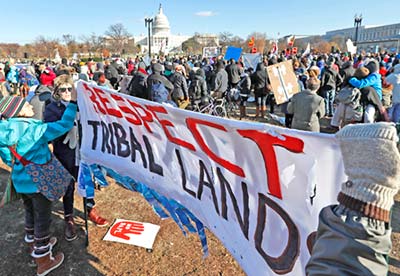
Vol. 80/No.48 December 26, 2016
(front page)
Protests in Washington: ‘Free Leonard Peltier!’
Victory in Standing Rock boosts Peltier fight

The victory won by the Standing Rock Sioux and their supporters, keeping the oil pipeline from crossing sacred land and threatening their water supply, has given a boost to efforts to win clemency for Peltier.
The Native Americans who led the struggle at Standing Rock are fighting “for the same purpose” that Peltier has spent his life fighting for, his son Chauncey Peltier told the press conference Dec. 7.
Peltier was framed up on charges growing out of battles for Native American rights on the Pine Ridge Reservation in South Dakota in the 1970s. Dozens of organizations and prominent individuals worldwide have joined the campaign for his release, including the American Association of Jurists, the National Congress of American Indians, Amnesty International, the International Federation of Human Rights, the World Council of Churches and the European Parliament.
Others at the press conference included Justin Mazzola for Amnesty International; John Dulles, former regional director of the U.S. Commission on Civil Rights; former American Indian Movement members Jean Roach and Norman Patrick Brown; and Cynthia Dunne, one of Peltier’s lawyers.
“At a lot of construction sites, you put your name on your hard hat,” noted Chauncey Peltier, who is a union construction worker in Oregon. Co-workers and supervisors have asked if he’s Leonard’s son. “Some tell me, ‘I’ve read both sides and your father got a bad deal, he should be free.’”
“Free Leonard Peltier,” said Gabrielle Tayac, of the Piscataway Nation, welcoming hundreds of participants to a “Standing Rock and Beyond” rally and march Dec. 10. Chauncey Peltier was a featured speaker.
In his petition for “executive clemency and/or commutation of sentence” sent to Obama in February, Leonard Peltier noted that the goal of the American Indian Movement at the time of his arrest was to protest “the Bureau of Indian Affairs funding cuts for already failing native schools, inadequate health care; the mining and takings of sacred lands; continuing violations of Treaties by the U.S. government; and many other avoidable injustices facing Natives across the country.”
In 1973, Peltier says, the Oglala Sioux Civil Rights Organization was formed “to challenge the corrupt leadership of the then-tribal-chairman Dick Wilson.” Wilson banned AIM members from speaking at tribal meetings and planned to give tribal lands to the National Park Service. With the aid of the FBI, Wilson formed a thug group, the Guardians of the Oglala National, known by its acronym GOONS, to harass and beat opponents of his rule in collaboration with Washington.
AIM organized a 71-day occupation of Wounded Knee on the reservation in 1973 that ended with 100 participants arrested, AIM members dead, and 12 missing following attacks by federal agents and GOONS.
Many AIM activists, including Peltier, set up camp on the reservation to protect residents from Wilson, his GOONS and their FBI allies. It’s against this background that a June 26, 1975, shootout took place in Oglala. Peltier was falsely accused of killing two plainclothes FBI agents, Jack Coler and Ronald Williams. AIM activist Joe Stuntz was also killed.
Peltier was given two life-sentences, even though the government admitted after the trial there is no physical evidence linking Peltier to the deaths. A federal appeals court ruled he was not entitled to a new trial because new information made it “possible” but not “probable” he would have been acquitted.
Speakers at the “U.S. Prisons: Conditions of Confinement” conference at American University law school included Robert King, of the Angola 3, who spent 31 years in jail at Louisiana state prison; Pooja Gehi, executive director of the National Lawyers Guild; Jamelia Morgan, American Civil Liberties Union National Prison Project; Lenny Foster, Navajo Nation Corrections Project; Nick Estes, Red Nation; Jasmine Heiss, International Leonard Peltier Defense Committee; and Daniel McGowan, who spent several years in prison in the notorious Communication Management Units in Terre Haute, Indiana, and Marion, Illinois.
Like many in the aging U.S. prison population, Peltier has serious health problems, Heiss said. Authorities have often put obstacles to his getting needed medical treatment. Right now he is suffering from a dangerous aneurism that prison authorities are delaying care for.
Despite his age and medical problems, Peltier is being held in a maximum security prison in Coleman, Florida. This makes it difficult for his family in North Dakota to visit.
“We can’t fall victim to pessimism,” said Nick Estes of the Red Nation. “Let’s celebrate the victory at Standing Rock and move forward.”
To get involved, visit: www.whoisleonardpeltier.info. Write President Barack Obama to demand he grant clemency, at the White House, 1600 Pennsylvania Ave. NW, Washington, DC 20500.
And write to Leonard Peltier, #89637-123, USP Coleman I, P.O. Box 1033, Coleman, FL 33521.
Related articles:
Support grows for fight to reverse censorship of ‘Militant’ at Attica
Greetings to workers behind bars
Front page (for this issue) | Home | Text-version home